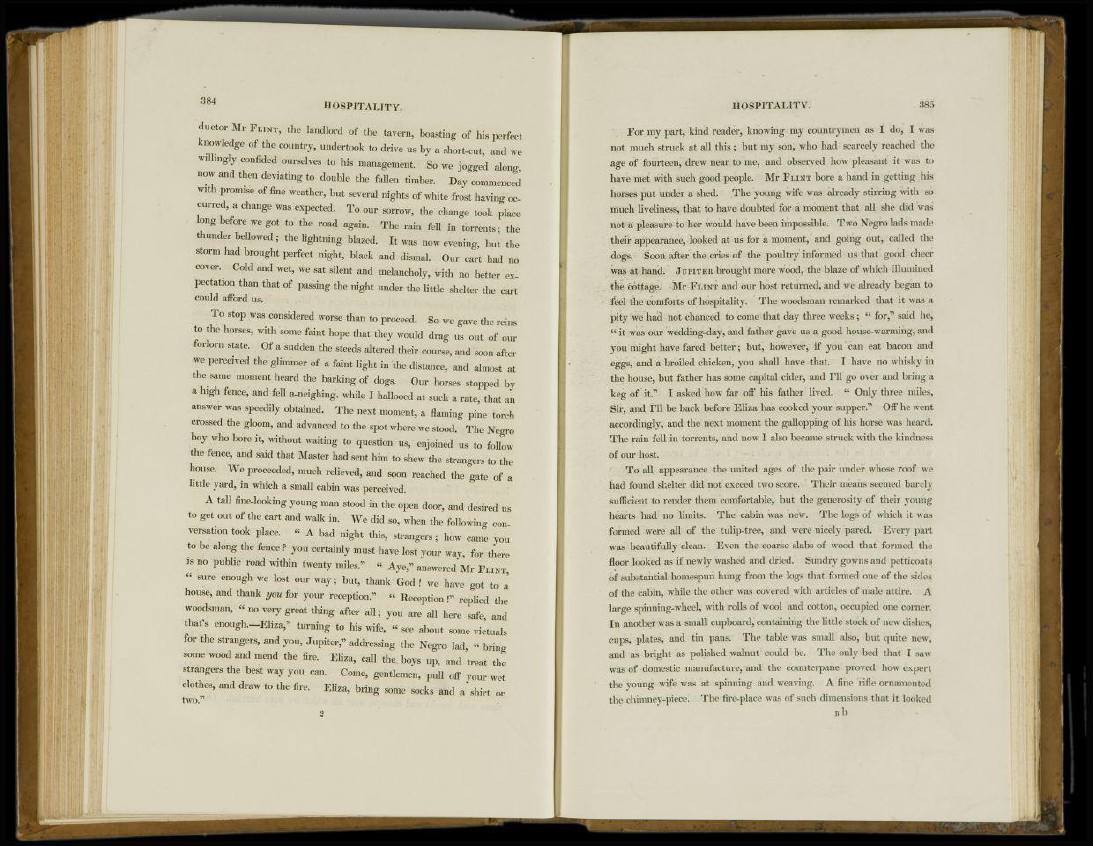
ductor Mr FLINT, the landlord of the tavern, boasting of his perfect
knowledge of the country, undertook to drive us by a short-cut, and we
willingly confided ourselves to his management. So we jogged along,
now and then deviating to double the fallen timber. Day commenced
with promise of fine weather, but several nights of white frost having occurred,
a change was expected. To our sorrow, the change took place
long before we got to the road again. The rain fell in torrents; the
thunder bellowed ; the lightning blazed. It was now evening, but the
storm had brought perfect night, black and dismal. Our cart had no
cover. Cold and wet, we sat silent and melancholy, with no better expectation
than that of passing the night under the little shelter the cart
could afford us.
To stop was considered worse than to proceed. So we gave the reins
to the horses, with some faint hope that they would drag us out of our
forlorn state. Of a sudden the steeds altered their course, and soon after
we perceived the glimmer of a faint light in the distance, and almost at
the same moment heard the barking of dogs. Our horses stopped by
a high fence, and fell ar-neighing, while I hallooed at such a rate, that an
answer was speedily obtained. The next moment, a flaming pine torch
crossed the gloom, and advanced to the spot where we stood. The Negro
boy who bore it, without waiting to question us, enjoined us to follow
the fence, and said that Master had sent him to shew the strangers to the
house. We proceeded, much relieved, and soon reached the gate of a
little yard, in which a small cabin was perceived.
A tall fine-looking young man stood in the open door, and desired us
to get out of the cart and walk in. We did so, when the following conversation
took place. " A bad night this, strangers; how came you
to be along the fence ? you certainly must have lost your way, for there
is no public road within twenty miles.'" " Aye,"" answered Mr FLINT,
" sure enough we lost our way; but, thank God I we have got to a
house, and thank YOU for your reception."" " Reception !" replied the
woodsman, " no very great tiling after all; you are all here safe, and
that's enough.—Eliza,'1 turning to his wife, " see about some victuals
for the strangers, and you, Jupiter,'" addressing the Negro lad, " bring
some wood and mend the fire. Eliza, call the boys up, and treat the
strangers the best way you can. Come, gentlemen, pull off your wet
clothes, and draw to the fire. Eliza, bring some socks and a shirt or
two."
For my part, kind reader, knowing my countrymen as I do, I was
not much struck at all this; but my son, who had scarcely reached the
age of fourteen, drew near to me, and observed how pleasant it was to
have met with such good people. Mr FLINT bore a hand in getting his
horses put under a shed. The young wife was already stirring with so
much liveliness, that to have doubted for a moment that all she did was
not a pleasure to her would have been impossible. Two Negro lads made
their appearance, looked at us for a moment, and going out, called the
dogs. Soon after the cries of the poultry informed us that good cheer
was at hand. JUPITER brought more wood, the blaze of which illumined
the cottage. Mr FLINT and our host returned, and Ave already began to
feel the comforts of hospitality. The woodsman remarked that it was a
pity we had not chanced to come that day three weeks ; " for," said he,
" it was our wedding-day, and father gave us a good house-warming, and
you might have fared better; but, however, if you can eat bacon and
eggs, and a broiled chicken, you shall have that. I have no whisky in
the house, but father has some capital cider, and I'll go over and bring a
keg of it."" I asked how far off his father lived. " Only three miles,
Sir, and 111 be back before Eliza has cooked your supper." Off he went
accordingly, and the next moment the gallopping of his horse was heard.
The rain fell in torrents, and now I also became struck with the kindness
of our host.
To all appearance the united ages of the pair under whose roof we
had found shelter did not exceed two score. Their means seemed bare ly
sufficient to render them comfortable, but the generosity of their young
hearts had no limits. The cabin was new. The logs of which it was
formed were all of the tulip-tree, and were nicely pared. Every part
was beautifully clean. Even the coarse slabs of wood that formed the
floor looked as if newly washed and dried. Sundry gowns and petticoats
of substantial homespun hung from the logs that formed one of the sides
of the cabin, while the other was covered with articles of male attire. A
large spinning-wheel, with rolls of wool and cotton, occupied one corner.
In another was a small cupboard, containing the little stock of new dishes,
cups, plates, and tin pans. The table was small also, but quite new,
and as bright as polished walnut could be. The only bed that I saw
was of domestic manufacture, and the counterpane proved how expert
the young wife was at spinning and weaving. A fine rifle ornamented
the chimney-piece. The fire-place was of such dimensions that it looked
BP